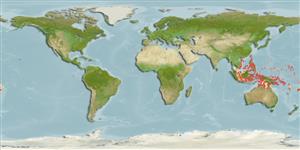>
Gobiiformes (Gobies) >
Gobiidae (Gobies) > Gobiinae
Etymology: Trimma: Greek, trimma, -atos = something crushed (Ref. 45335); cana: Specific epithet is an arbitrary combination of letters embodying the first three letters of both the English words 'candy' and 'cane'; an allusion to adding red bands to a white candy formed in the shape of a shepherd's crook. An noun in apposition..
More on author: Winterbottom.
Environment: milieu / climate zone / depth range / distribution range
Ecologia
marinhas demersal; intervalo de profundidade 12 - 35 m (Ref. 90102). Tropical
Western Pacific: Philippines, Caroline Is., Fiji, Marshall Is., and Palau
Tamanho / Peso / Idade
Maturity: Lm ? range ? - ? cm
Max length : 2.5 cm SL macho/indeterminado; (Ref. 52975)
Espinhos dorsais (total): 7; Raios dorsais (total): 9-10; Espinhos anais 1; Raios anais : 8 - 10. Diagnosis: White background with 8 distinct vertical bars on head and body; yellow spots on the medial fins; a well-defined dark bar across the postorbital region of the skull (may be partially obscured by the overlying anterior extension of the epaxialis body musculature in larger specimens). No scales on head. Opercle, cheek, or nape. A second dorsal spine varying from slightly to very elongate (as far as the mid-peduncle). A well-developed interorbital trench. A variably-developed postorbital trench (usually developed). A fifth pelvic fin ray which is unbranched and 50-85% of the fourth.
Solitary or in small groups on surface of hard corals. Inhabits steep outer reef slopes in 12-35 m (Ref. 90102).
Ciclo de vida ou comportamento de acasalamento
Maturidade | Reprodução | Desova | Ovos | Fecundidade | Larvas
Winterbottom, R., 2004. Three new species of Trimma (Pisces: Gobiidae) from the central, western and south Pacific. aqua, J. Ichthyol. Aquat. Biol. 9(1):7-16. (Ref. 52975)
Status na Lista Vermelha da UICN (Ref. 130435)
Ameaça para os humanos
Harmless
Uso pelos humanos
Mais informação
Nomes comunsSinônimosMetabolismoPredadoresEcotoxicologiaReproduçãoMaturidadeDesovaAgregação de desovaFecundidadeOvosDesenvolvimento dos ovos
ReferênciasAquaculturaPerfil para aquaculturaEstirpesGenéticaElectrophoresesHereditariedadeDoençasProcessamentoNutrientsConversão de massa
ColaboradoresFotosStamps, Coins Misc.SonsCiguateraVelocidadeTipo de nataçãoÁrea branquialOtólitosCérebrosVisão
Ferramentas
Relatórios especiais
Baixar XML
Fontes da internet
Estimates based on models
Preferred temperature (Ref.
123201): 26.3 - 29, mean 28 °C (based on 102 cells).
Índice de diversidade filogenética (Ref.
82804): PD
50 = 0.5000 [Uniqueness, from 0.5 = low to 2.0 = high].
Bayesian length-weight: a=0.01023 (0.00477 - 0.02194), b=3.02 (2.84 - 3.20), in cm total length, based on LWR estimates for this (Sub)family-body shape (Ref.
93245).
Resiliência (Ref.
120179): Elevada, tempo mínimo de duplicação da população menor que 15 meses (Preliminary K or Fecundity.).
Fishing Vulnerability (Ref.
59153): Low vulnerability (10 of 100).
Nutrients (Ref.
124155): Calcium = 1050 [421, 3,702] mg/100g; Iron = 3.08 [1.49, 7.03] mg/100g; Protein = 17.4 [15.3, 19.1] %; Omega3 = 0.285 [0.093, 0.794] g/100g; Selenium = 47.7 [15.7, 125.5] μg/100g; VitaminA = 32.2 [7.5, 129.8] μg/100g; Zinc = 4.04 [2.34, 6.73] mg/100g (wet weight);
